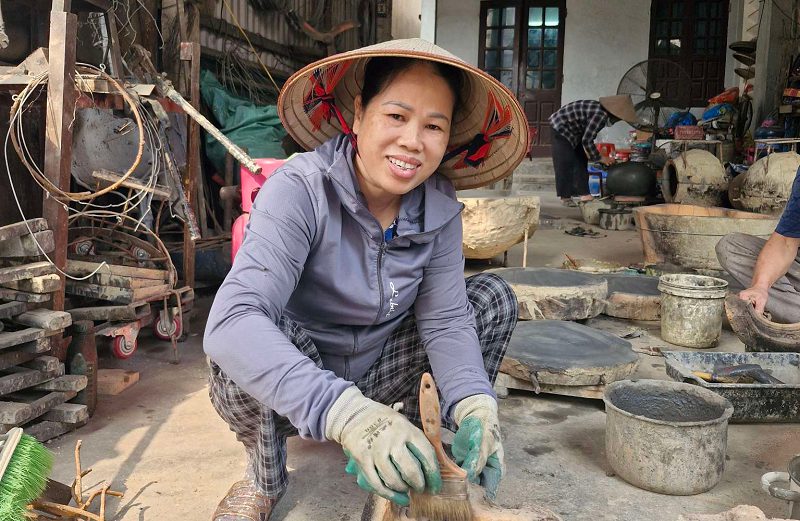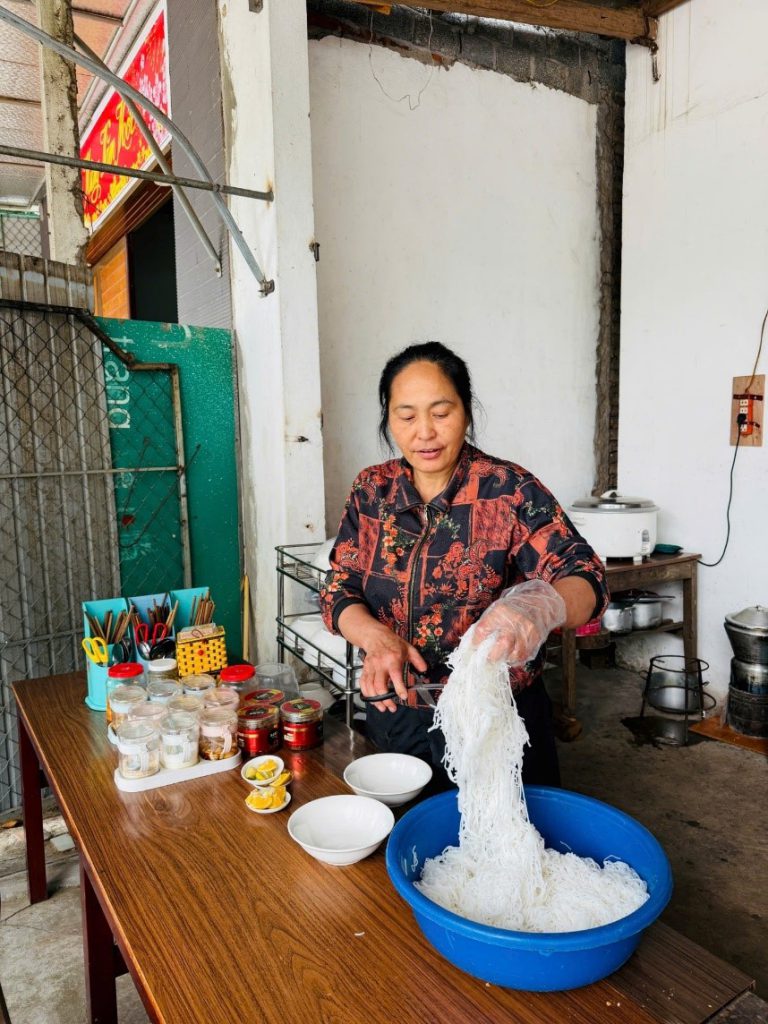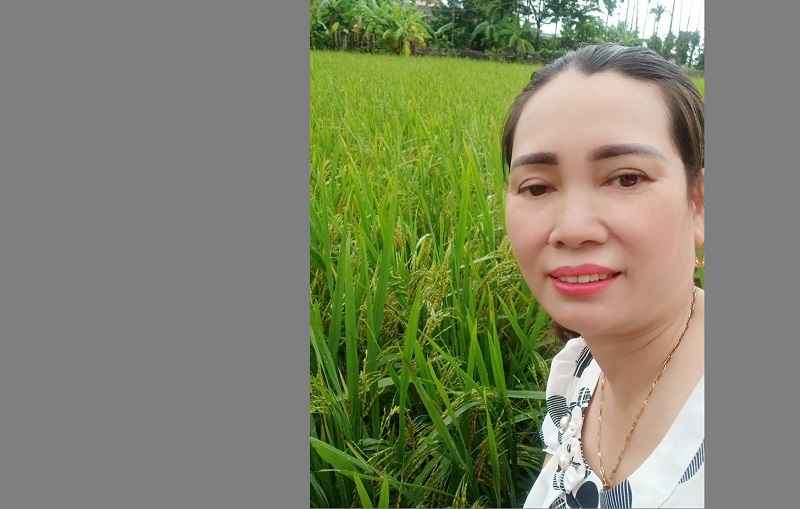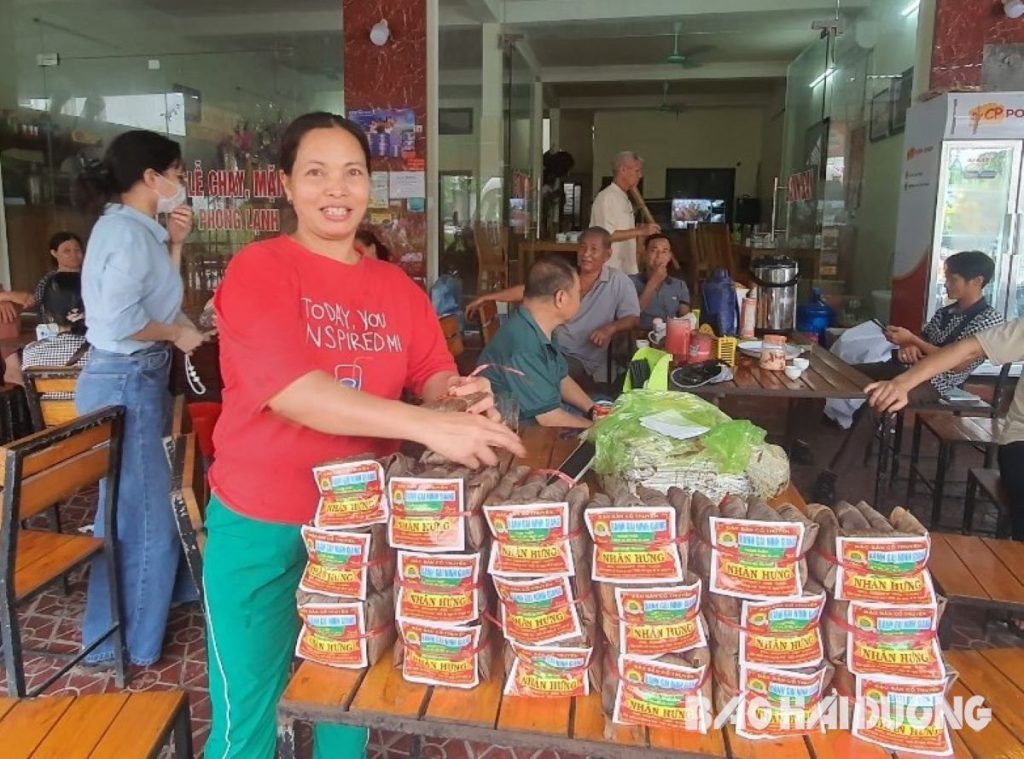Member: Dau Thi Trung
Age: 47
Living: Dien Chau distric, Nghe An province

We often think that the garbage after being thrown away will go to the garbage disposal, in fact, a majority of them will go to landfills and even into the ocean. But what actually happens to that piece of garbage and how long will it affect our environment?
The most permanent type of waste is plastic. It is easy to produce, but difficult to decompose. A plastic bag, sometimes used for 5 minutes, takes only 5 seconds to produce, but it takes 500-1,000 years to decompose. And when they decay, it does not mean they have been completely excluded, just from a large piece now they split into small pieces and continue to destroy the ocean little by little. So recycling plastic waste, turning them into resources is one of the current optimal solutions. Let’s learn about a plastic recycling model of TYM member in Nghe An and listen to her story:
VISION FOR BUILDING THE BRAND “SLIPPERS MADE FROM PLASTIC WASTE
Not only stopping at collecting and recycling plastic waste, thanks to TYM’s microloan, Mrs. Dau Thi Trung, member of TYM, Dien Chau Branch, Nghe An, has confidently developed a business model. Use plastic waste to make slippers. She is confident with the longer-term plan by registering product copyright, marketing to reach a wider market.
Everyone wants to throw away garbage in general and plastic waste in particular. Mrs. Trung collects, gathers and turns it into a source of income for the family. What do you think when working “paradoxically” like that?
Mrs. Trung: Our family started to build a model to recycle plastic waste to produce slippers in 2015. Up to now, I still think that my husband and I came to this job probably because of a word “predestined”. We got married when we were poor, and there were not many people working as hired laborers are abundant everywhere. By 2013, the determination to borrow money to start a transport business was not successful. My wife and I were infertile; we made many efforts to save money for medical treatment so the economic pressure was even heavier. Then at that difficult time, when I was at home because I had no stable job, I noticed that plastic waste was a lot everywhere. My wife and I just have a simple idea that if plastic waste is buried, hundreds of years later, it will not be completely decomposed but and also pollute the environment. So, why don’t we recycle plastic waste to contribute to reducing environmental pollution and earning extra income? Then the couple started by learning the models of nearby plastic recycling and learning the experiences of those who had done it before. At the same time, we also mobilized the surrounding villagers not to throw waste but give to us to collect and use. Initially, it was just a simple source, and gradually, the development model, we went to buy everywhere and produce slippers in large quantities. Thanks to that, the family’s economy is also stable, giving us money for medical treatment and finally achieving our dream of having a first child for many years.
When you started your recycle business, what difficulties have you had to overcome?
Mrs. Trung: In general, when starting a business, everyone has difficulties. We were fortunate to receive a lot of technical support, experience sharing from others, so the biggest problem was financial resource. At the beginning of our establishment, we lacked the initial capital to invest in factories and machines. Until production, due to lack of experience, the production line was not effective and often lacked capital to buy scrap.
At the beginning, many people were afraid to take out loans. Even many people think that recycling plastic waste is extremely impracticable. We did not have any stable source of loan besides TYM, where we have borrowed steadily since 2013. With this new project, TYM has continued to trust and create conditions for us to borrow. Not only that, our long-term savings at TYM along with loans from some of our relatives, we also had a decent financial resource. Our family invested in buying small capacity machines but when the market accepted the product, we continued to borrow from other organizations and borrowed TYM with a maximum capital of VND 50,000,000 and bought more machines.
In fact, the plastic waste collection model has been done by many people. Have you found a new and more effective direction for your business?
Mrs. Trung: It is true that plastic waste collection is no longer a new model. However, in order to put into a “closed” model which both handles and recycles plastic waste and produces it into sandals, not many of our local business households can do it. My production process is also very simple, purchasing plastic waste; then they are categorized to suit the product and transfer it to the blender into raw materials. When it becomes raw materials, we switch to the machine molding and processing into products. The process is by machine and the steps are manned by operators.
Through the manufacturing process, we are always aware of learning from online and friends, and especially really to listening to customers’ opinions. We revise the production process and so that customers feel the change of design and standards so that they can reliably use the products. When we deliver to provinces, we always ask our customers whether they are satisfied or not and note their opinions and come up with a suitable solution together.
We started the production of the first slippers, diverse designs to suit the needs and tastes of consumers. When the first sandals were made, our neighbors were the first customers. They were very happy and very surprised because the plastic bottles and jars they throw away every day seemingly indestructible have now been recycled into beautiful plastic slippers that cost the same price.
Production and business activities are changing very fast according to the economic development. How do you plan to keep your manufacturing business from falling behind, and be able to expand your business?

Mrs. Trung: Currently we are maintaining seven employees, but in the future we want to buy more modern machinery and we will need more capital and workers. In particular, we are always interested in the output and look forward to expanding to the southern markets.
When I expand the scale of production, I will hire a marketing staff. Southern dealers are always supported by marketing in many ways to make a lasting connection and our reputation always goes with the product. We will connect via Zalo for timely communication. Product value always comes with the brand so in the future we will register exclusive models for our own products. When we have reputable brands, we increase our productivity even more and purchase more modern equipment.
Thank you Mrs. Trung!
05/07/2021




